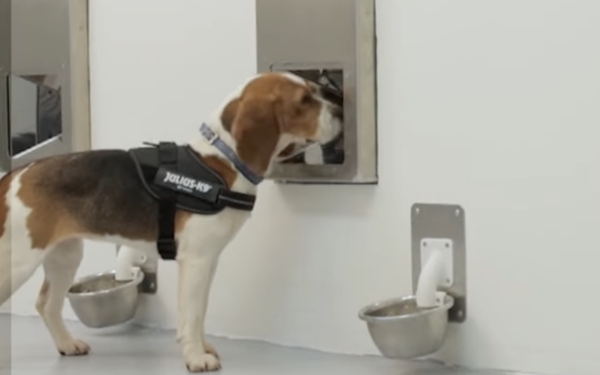
Snoopy would be proud.
SpotitEarly, an Israeli-based startup, has combined the scent-sniffing AI (Animal Intelligence) of beagles with AI (Artificial Intelligence) technology to develop an at-home breath test for cancer
screening.
The test, perhaps just a year away from U.S. Food and Drug Administration approval, would be used for early detection of breast, prostate, lung, and colon cancer, which together
account for over half of all newly diagnosed cancer cases. The American Cancer Society (ACS), for one, strongly advocates early cancer screenings for a dramatic reduction in both cases and deaths.
And now, Dr. J. Leonard Lichtenfeld, formerly deputy chief medical officer for the ACS, has joined SpotitEarly as its chief medical officer.
“I’ve been engaged in discussions
around dogs detecting cancer for two decades,” Dr. Lichtenfeld tells Pharma & Health Insider, “but [there have been] a lot of failures along the way…by major research
institutions, by major companies.”
advertisement
advertisement
SpotItEarly, on the other hand, has “gone a step beyond what others have done to demonstrate that this was a viable option.” The company,
has not only “captured the significant capacity of dogs to detect cancer, but melded that with effective technologies and rigorous development of algorithms to demonstrate that this process can
detect cancer early.”
Dr. Lichtenfeld points, for instance, to an initial clinical study of 1,400 patients in Israel showing a 94.8% accuracy rate
Shlomi
Madar, SpotitEarly’s vice president of business development, North America, tells Pharma & Health Insider that a study with the University of Pennsylvania will begin next year,
“to collaborate and validate our initial findings.”
Madar says the SpotitEarly test will be prescribed via physicians, with users either picking it up in person or receiving it via
home delivery. Patients then breathe into a mask for two minutes, and results are analyzed on a quick turnaround basis by a lab. “We are actually planning to open a U.S.-based lab in 2026, and
we’ve just co-submitted a large grant with a well-known health system for this purpose,” he adds.
SpotitEarly has already produced a consumer-facing video, under the tagline “Early detection is one breath away,” showing how the whole process will work.
The commercialization
plan, Madar says, is to start with breast cancer and then expand to the other three cancers, “but there is the potential down the road for one breath test for all four cancers.”
Furthermore, “if you ask me to provide an outlook for the next five years, we can go broader than these four cancers, and even…venture outside of cancer.”
That’s
one reason why a group of SpotitEarly’s most valued employes are still hard at work: those beagles.
“They’re a part of the team,” Madar says. “They like working,
they’re the best sniffers, and they do better than any other breed for cancer detection.”
“We have packs who are trained to sniff specific cancers,” he explains.
SpotitEarly uses sensors that measure the dogs’ behavior as well as physiological measures. “We’re looking at the dilation of their pupils, their heart rate,” Madara gives
as examples. “We collect hundreds of signals per second in real time.”
Then, he says, “the AI analyzes all these signals and can really improve the accuracy level of the
test, so we can really know what a true positive and a true negative is. Only he combination of this AI and bio-component allows you to get to the level of accuracy that we’re seeing.”
Such a test can be a major advance on the cancer screening front, where many people don’t want to go to an office for screening or balk at expenses. SpotItEarly says its test will be
affordable, although exact details on the pricing aren’t available yet.
Dr Lichtenfeld points out that at-home cancer screenings up to now have mainly been limited to colon cancer, such
as Exact Sciences’ Cologuard.
“What SpotitEarly is doing is providing a very simple kit to take a breath sample, and a quick turnaround, which is unique in this space,” he
says.